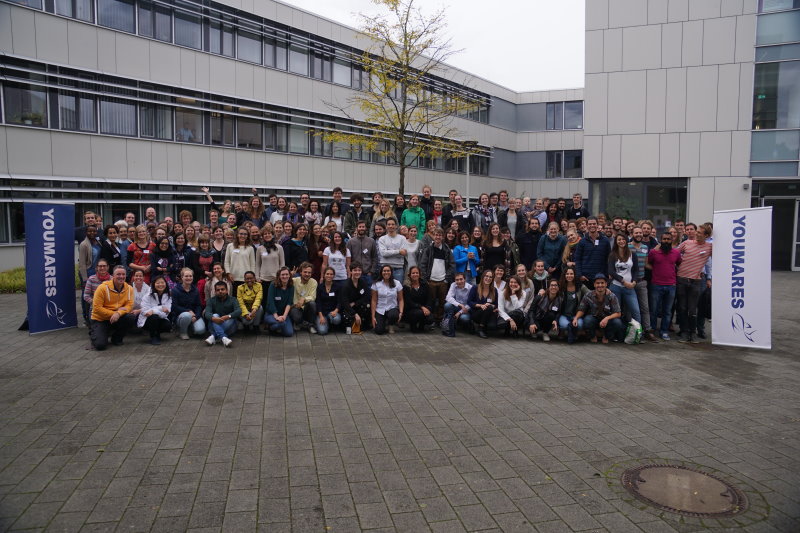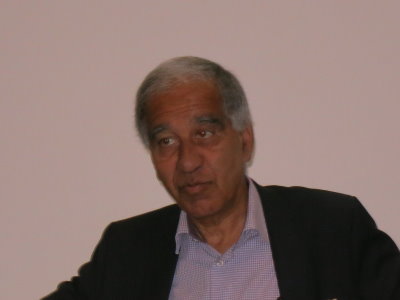 The science conference for YOUng MArine RESearchers has become a household name not only among young German scientists. This year its eighth edition was celebrated at Kiel University from 13 to 15 September. Almost 190 registered participants filled the altogether 15 sessions in three packed parallel streams. Plenaries provided unifying presentations and discussions, including with such international luminaries as climate research champion Prof. Mojib Latif of GEOMAR, who spoke about the role of the ocean in climate change. He reminded the audience of how the greenhouse effect works and expressed his concern that the target of keeping global warming below 1.5°C was by now unattainable.
The science conference for YOUng MArine RESearchers has become a household name not only among young German scientists. This year its eighth edition was celebrated at Kiel University from 13 to 15 September. Almost 190 registered participants filled the altogether 15 sessions in three packed parallel streams. Plenaries provided unifying presentations and discussions, including with such international luminaries as climate research champion Prof. Mojib Latif of GEOMAR, who spoke about the role of the ocean in climate change. He reminded the audience of how the greenhouse effect works and expressed his concern that the target of keeping global warming below 1.5°C was by now unattainable.
The natural trapping of heat accounted for 33°C and made the climate suitable for our civilsations. But the great acceleration through massive CO2 emissions was now impacting the global climate system in worrying ways. Where did the trapped heat go? 93.4% was taken up by the ocean, 2.3% by the atmosphere, 2.1% by the continental land masses 0.8% by the Arctic Sea and the remaining 0.9% by glaciers, polar caps and the Greenland and Antarctic ice shields. Among others this leads to measurable thermic expansion of the ocean - contributing to sea level rise: about 25 cm and so far about 50% of the total, but ice melting was on the increase in recent years.
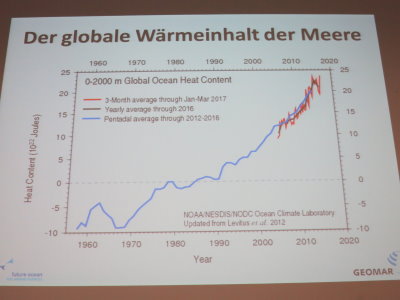 He then went through the trends in the measurements of key parameters affected by the greenhouse effect. Curve after curve showed the effect since the start of measurements:
He then went through the trends in the measurements of key parameters affected by the greenhouse effect. Curve after curve showed the effect since the start of measurements:
- heat content of the huge water body of the global ocean up,
- mean atmospheric temperature up,
- Arctic sea ice down - equivalent to a 30% reduction in the average coverage since the beginning of satellite observations in 1979,
- melting of glaciers in Greenland up,
- parts of the tropical seas have a temperature increase of half a degree since 1980 - tropical corals are expected to be gone by the middle of the century; the global average is +0.6 degrees, the Arctic heats up faster than other parts of the globe.
When looking at the global CO2 budget (2006 to 2015), Mojib Latif recalled that 91% or 34.1 Gt CO2/year were due to industrial emissions/energy, 9% or 3.5 Gt CO2/year to deforestation and other land use change. In terms of sinks the distribution was 44% (16.4 Gt CO2/year) in the atmosphere, 31% (11.6 Gt CO2/year) in forests, and 25% (9.7 Gt CO2/year) in the ocean.
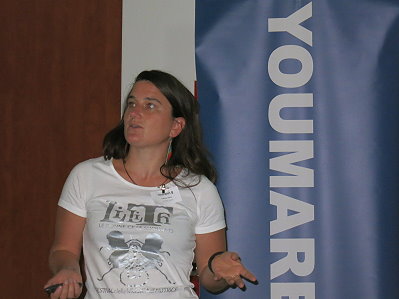 Atmospheric CO2 climbed up with record speed in recent decades. There is still no decrease in sight though at least emissions seem to have stabilised during the last three years. However, China, accounting for 30% of current emissions, can under the Paris Agreement still increase its CO2 release until 2030. In the ocean CO2 was provoking measurable acidification.
Atmospheric CO2 climbed up with record speed in recent decades. There is still no decrease in sight though at least emissions seem to have stabilised during the last three years. However, China, accounting for 30% of current emissions, can under the Paris Agreement still increase its CO2 release until 2030. In the ocean CO2 was provoking measurable acidification.
Calcareous plankton algae and particularly marine animals with calcareous exo-skeletons (bilvalves, etc) as well as corals already need to spend more energy to grow and even keep their bodies together.
He concluded with a quote from the remarks of former President Obama at the opening day of the Paris Climate Summit, 30 November 2015: "There is no thing as being too late. And when it comes to climate change that hours is almost upon us".
The papers covered a broad array of topics mostly based on the young researchers' master or PhD theses grouped into sessions which addressed ecology, biodiversity, conservation, physical oceanography, marine technology, plastic litter in the sea and more.
Several workshops and guided tours, e.g. to the Zoological Museum, were on offer during Thursday afternoon. The workshop about future and emerging topics in marine science organised by the Project Management Team Juelich and Prof. Martin Visbek of GEOMAR turned out particularly interesting.
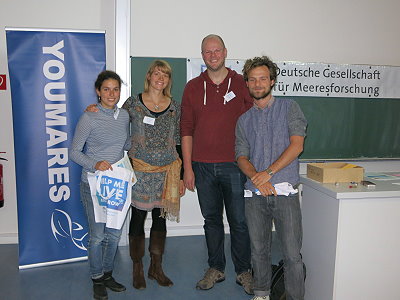 It was intended as a contribution to a broad based consultative process about the contributions of marine sciences to meeting current and future societal challenges.
It was intended as a contribution to a broad based consultative process about the contributions of marine sciences to meeting current and future societal challenges.
On the basis of the strongest ideas coming out of this process involving also experienced scientists and stakeholders, among others, it is expected that key themes will be determined for future research funding under the new "Blue Ocean Science Programme" in Germany.
Among the topics emerging from group conversations of workshp participants were a strong emphasis on taxonomic work and research on low impact fisheries.
Dr. Lydia Gustavs of the Project Management Juelich presented the results in the plenary the following day and conducted an instantaneous poll via smart phone to corroberate and extend the prioritisation developed during the workshop.
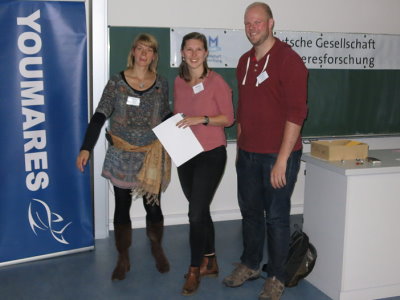 Not everybody could be accommodated for an oral presentation, so another option was to present a poster.
Not everybody could be accommodated for an oral presentation, so another option was to present a poster.
At the end of the conference, participants could select the best oral presentations and the best posters.
Springer Nature offered book vouchers to the top three and Mundus maris offered a mug and cotton bags with the famous mascots and the slogan "I am still a baby, let me live and grow".
The best poster was by Mildred Johnson and Laura Hennigs titled "The effect of elevated and fluctuating pCO2 concentrations on the growth of calcifying marine epibionts". The picture shows the winners with Lisa Hentschel and Simon Jungblut of the organising team.
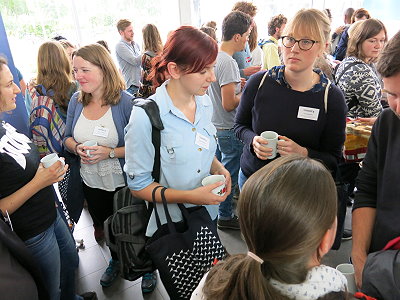 Nora-Charlotte Pauli was selected as winner for her talk about "Fouling and degradation of plastic bags - an in situ experiment".
Nora-Charlotte Pauli was selected as winner for her talk about "Fouling and degradation of plastic bags - an in situ experiment".
YOUMARES is self-organised by young researchers following the concept first developed by the Working Group Research and Studies of the German Society for Marine Research (DGM).
The organising team around Dr Viola Liebich of DGM did a sterling job to create a welcoming atmosphere conducive to lively exchange, during the scientific sessions, coffee breaks and various social events.
The smooth organisation paved the way for record participation, lots of sponsors and an early confirmation for next year's event: YOUMARES 9 will take place at the Carl von Ossietzky University in Oldenburg, Germany, from 12 to 14 September 2018. Well done!
Check out the entire book of abstracts and more info about the conference on the dedicated website.
Text and pictures by Cornelia E Nauen.
